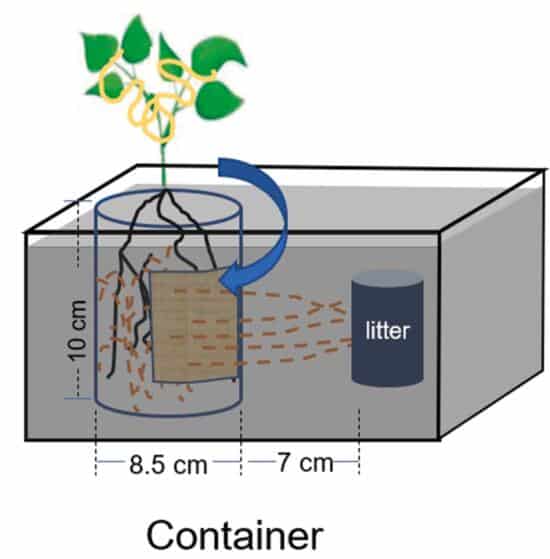Effects from parasitism and parasitic litter input can affect the decomposition of litter, but the mechanism is unclear. We hypothesized that the decomposition of litter produced by the holoparasite Cuscuta australis is promoted more strongly by arbuscular mycorrhizal fungi (AMF) than the litter of its host Bidens pilosa and that parasitism by C. australis can indirectly suppress the ability of AMF to promote the decomposition of host B. pilosa litter. We conducted two container experiments to compare the effect of AMF on the decomposition of 15N-labelled C. australis and B. pilosa litter filled in litter bags and to test the effect of C. australis parasitism on the decomposition of B. pilosa litter by AMF. The percentage of 15N remaining, AMF hyphal density, and enzyme activity in the litter bags were measured, and the bacterial communities in the litter bags were also tested using 16S amplicon sequencing. We found that the amount of 15N that remained in the bags with C. australis litter was significantly higher than that in the bags with B. pilosa litter. AMF significantly decreased the remaining 15N and changed the bacterial community in bags with B. pilosa litter but did not significantly affect these factors in the bags with C. australis litter. The bacterial diversity, AMF hyphal density and the abundance of several genes related to the N cycle, including assimilatory nitrate reduction and anaerobic ammonium oxidation, in the bags with C. australis litter were significantly lower than those in the bags with host litter. Parasitism significantly reduced the hyphal density of AMF, increased the 15N that remained in litter bags, and decreased the abundance of several genes related to the N cycle, such as those involved in anaerobic ammonium oxidation. Our results indicate that AMF plays a key role in the parasitism and litter effects of parasitic plants on soil nutrient cycling.
Soil Biology and Biochemistry 174: 108837, 2022.
